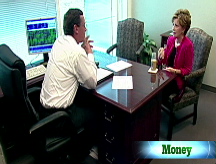Why it can hurt so much to sell
Paper losses sting, but cashing out losers can make your psychic pain even worse.
(Money Magazine) -- Let's say you bought two stocks last year. One has tanked and looks likely to fall further. One has gone up and you expect it to keep rising. (Hey, it's not completely impossible.) Which are you more apt to sell?
Behavioral economists used to think they knew the answer: neither. Studies have shown that people tend to value things more - whether shirts, stereos or stocks - once they own them, no matter what has happened to their actual worth. This phenomenon is called the endowment effect. If it were the only psychological factor at work, you'd be reluctant to sell both losers and winners simply because they're already tucked into your portfolio.
But economics professors Nicholas C. Barberis of the Yale School of Management and Wei Xiong of Princeton University argue that when it comes to stocks, the endowment effect may be trumped by another factor. They call it realization utility.
Their hypothesis: The realized gains you get by selling an appreciated stock give you more of a thrill than entering the ticker at CNNMoney.com and seeing that the stock price has gone up. Why? The profit you lock in feels like proof that you made a good decision.
You can milk your enjoyment still more by bragging to your spouse of your triumph. Conversely, realizing losses is a major drag. Who wants to feel as if he or she made a huge mistake (and maybe get berated by the spouse too)?
Realization utility explains a lot of foolish behavior by investors. As several studies have shown, when the market is rising, people tend to trade more often than they do when the market is falling. They're trying to nab those feel-good gains.
But rapid trading isn't such a good idea since it inevitably increases your costs and lowers your long-term performance. Realization utility can also hurt you when the market is sinking - like, say, now - by encouraging you to hang on to stocks or funds that don't have a future. Even buy-and-hold investors sometimes need to admit they shouldn't have bought the darned shares in the first place. The longer you delay selling, the longer you can put off the pain of admitting your error.
The implications of all this are important to anyone who wants to make the smartest possible money decisions. Because you have an unconscious bias to keep your dogs, you should push yourself to look at them more critically than you normally would. And when you are tempted to sell a winner, ask yourself: Am I really making a smart investment decision or simply pursuing a delicious feeling of triumph?
And then ask your spouse to be extra-nice to you. You need to feel good right around now.
Have you found a way to pay for your child's college education without taking on too much debt? Did you choose a university based on its lower cost or loan programs, research scholarships, or just save up and pay in full? We want to hear from you. Send your stories to pwang@moneymail.com and you could be featured in an upcoming story. ![]()



